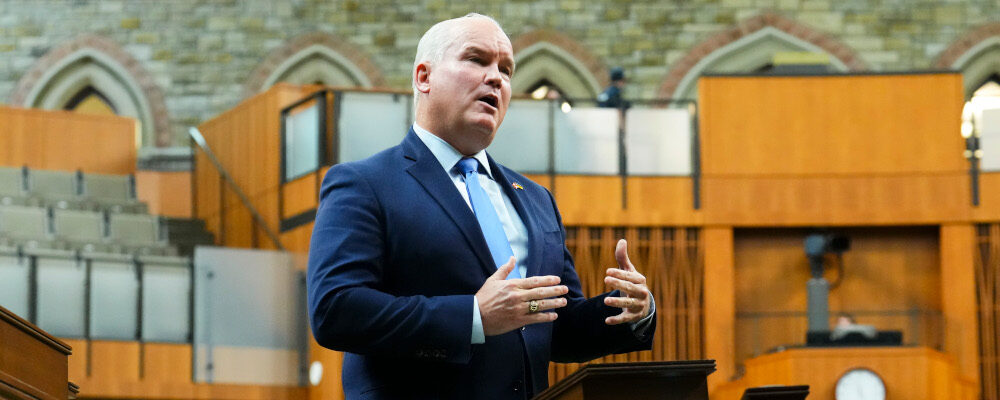One of the stranger and unhealthier developments in modern politics is the ceaseless process of redefining what we consider “radical” or “extreme” such that we risk rendering the terms essentially useless. This propensity for gratuitous labelling is invariably inflicted on the Right more than the Left.
Take Mitt Romney, the Republican presidential nominee in 2012. His campaign in hindsight was generally boring, uninspiring, and even at times hollow. But his politics were fundamentally recognizable as mainstream conservatism. Yet he was regularly characterized by the media, pundits, and his political opponents as a “radical”, extremist”, and voice of the “far right.”
The same treatment extended to Conservative MP (and former party leader) Erin O’Toole who delivered his final speech in the House of Commons this week before he departs from politics altogether this summer. Although his leadership of the Conservative Party was marked by a clear shift to the political centre, he was still denounced by the media and his opponents as bigoted, intolerant, and even a white supremacist for his use of the (completely benign) slogan “secure the future.”
O’Toole’s successor as Conservative leader, Pierre Poilievre, has been subjected to even greater claims about his alleged political extremism including from some voices who purport to be on the Right. These accusations, it must be noted, are mostly vague and unpersuasive. They generally refrain from policy specifics and instead point to communications and style.
There’s a good reason: Poilievre eschews the typical policy positions of the far-right figure that his critics wish he was. He’s pro-choice, pro-LGBT rights, and pro-immigration. As much as his critics may not like his elbows-up tactics, they’re wrong to confuse them as an expression of ideological radicalism. Poilievre’s politics are decidedly liberal.
It doesn’t mean that he hasn’t taken controversial positions (for instance his promise to fire the Bank of Canada governor) or ought to be free from criticism. Poilievre is no shrinking violet. He certainly gives as good as he receives in political combat. But it does mean that his critics need to go beyond strawman arguments in order to challenge his ideas.
It reflects the biggest problem with this tendency to characterize conventional political views as extreme. It’s a poor substitute for real dialogue and debate. Dismissing ideas that we disagree with as radical or extreme is inherently anti-pluralistic. It fails to grapple with the multiplicity of political preferences in a diverse society. There are bound to be competing views about the trade-offs between freedom and equality, the tensions between secular and religious conceptions of the good life, and the role of the state in the economy and society. Claiming that the other side of these debates is beyond the pale implies that there’s only one accepted “truth” in our political life.
Another problem is that it has a diminishing effect on our collective ability to identify certain ideas or political actors as actually extreme. There are indeed true extremists in our society but it becomes harder to call them out or marginalize them when the working definition of extremism encompasses debatable yet ultimately mainstream political views.

The danger is that it gradually leads people to shift their support from those accused of political extremism to actual extremists. It’s somewhat intuitive that after George W. Bush, Mitt Romney, and Paul Ryan were mischaracterized as reactionaries, their supporters became drawn to political figures who really are reactionary. If everyone to the right of a narrowly-prescribed set of acceptable political propositions about taxes and deficits is now considered extreme, then the distance to real extremism is necessarily shorter.
And then of course there’s the argument that the tendency to call certain ideas or politicians extreme tends to be rather one-sided. Ordinary conservative politicians are regularly subjected to the accusation of extremism but left-wing ones—including those with curious views about climate change or capitalism or gender, race, and sexuality—never face similar treatment.
Yet one could persuasively argue that many of the positions advanced by today’s progressive politicians are more outwardly left-wing than Poilievre, Doug Ford, Danielle Smith, or whatever conservative politician one thinks is moving to the far Right. There’s evidence in fact from the United States that progressives have moved more to the Left generally in the past several years than conservatives have moved to the Right. These findings broadly align with political developments in Canada. But there’s little discourse about these trends including whether they ought to be understood as extreme or radical.
The key point here isn’t a dispute about who is more or less extreme but rather a call to preserve claims about political extremism for when they’re really appropriate and otherwise to confront political ideas with arguments rather than labels. That’s how we can ultimately restore a healthier, more decent, and genuinely pluralistic politics.




